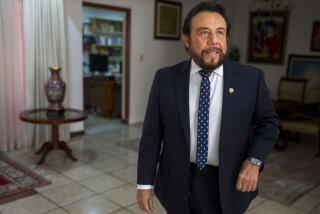Salvador Bishop Backs Constitution Changes to Promote Peace
- Share via
SAN SALVADOR — A conservative leader of the Roman Catholic Church said Sunday that the Christian Democratic administration here should consider rewriting El Salvador’s three-year-old constitution if that’s what it takes to make peace with leftist guerrillas.
In a homily at Metropolitan Cathedral, Bishop Gregorio Rosa Chavez implicitly criticized rightist sectors that have taken a hard line on forthcoming peace talks with the Marxist-led Farabundo Marti National Liberation Front.
At the conclusion of three days of preliminary talks in Mexico City last week, representatives of the government and guerrillas agreed to reopen long-stalled peace talks Sept. 19 in the eastern Salvadoran farming town of Sesori.
“Many people have spoken in the name of the people in recent days, but I am not sure their opinions objectively reflect the desires of the majority of Salvadorans,” said Rosa Chavez, the auxiliary bishop of San Salvador.
Last week, former presidential candidate Roberto d’Aubuisson, the best-known spokesman for El Salvador’s extreme political right, said that “anyone who believes he will find peace by talking to the subversives is crazy.”
Civilian and military officials of President Jose Napoleon Duarte’s U.S.-backed administration have repeatedly emphasized in recent weeks the position they have always taken: Negotiations with the rebels must be done within the framework of the constitution.
The government says it wants to talk to the guerrillas about laying down their arms and joining the electoral political process under the constitution, the current version of which was adopted in 1983.
The guerrillas say that they recognize neither Duarte’s elected government nor the constitution, both of which, they say, were put in place during a state of emergency without the participation of a large sector of Salvadoran society.
They want to discuss what is sometimes called a “Zimbabwe solution”--a share of the government for the insurgents and a merger of the guerrilla fighters into the regular armed forces, similar to the accord by which civil warfare was once ended in Zimbabwe.
“It’s well to assert that all agreements will be in accordance with our political constitution, but it would be better to ask that the search for peace follow not the letter but the spirit of the constitution,” Rosa Chavez said in his homily.
In response to reporters questions afterward, the bishop said, “If at any moment in the process of dialogue, (the constitution) were an obstacle, the constitution should be revised because man comes before the law.”
He said that “a totally abnormal situation demands extraordinary measures.” He added that people are tired after six years of civil war and that peace is the number one issue in the country.
The bishop’s comments surprised those who considered him to be among the conservative bishops of the Catholic hierarchy who were influential in drafting a pastoral letter a year ago that recognized the legitimacy of Duarte’s government and the 1983 constitution.
The government-guerrilla talks scheduled for Sesori next month will be their third formal peace-seeking session. The two sides met twice late in 1984 with no measureable progress.
The parties still have not agreed on an agenda, and another preliminary meeting on the topic of an agenda will be held at a still-undetermined time and place before the Sesori meeting.
More to Read
Sign up for Essential California
The most important California stories and recommendations in your inbox every morning.
You may occasionally receive promotional content from the Los Angeles Times.










